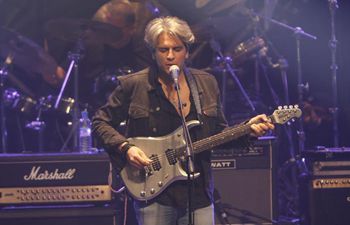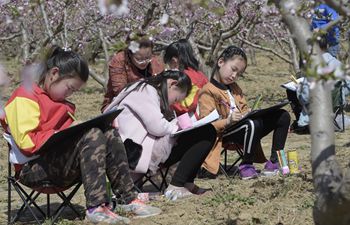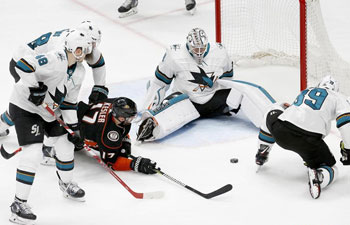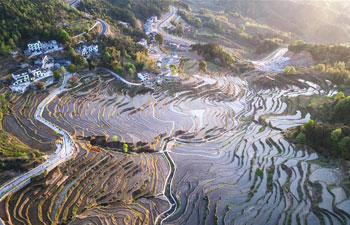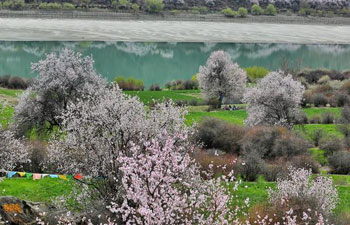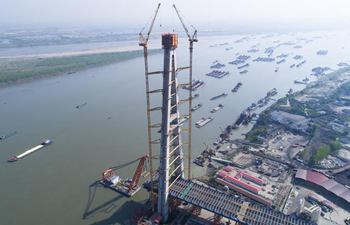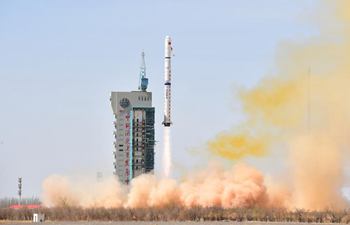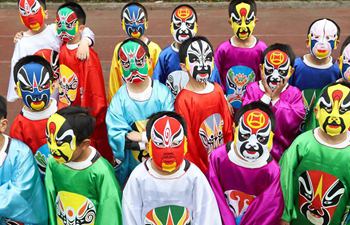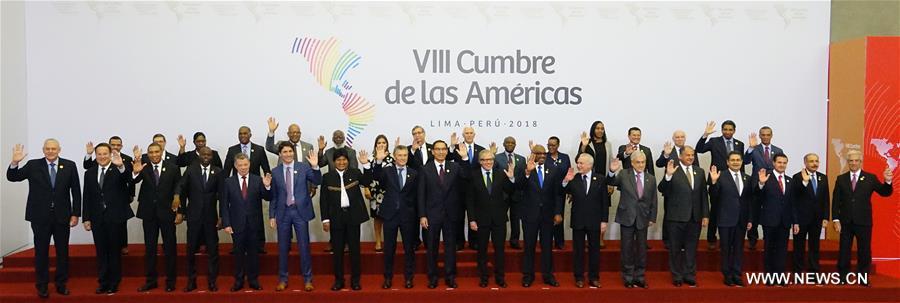
Participants of the eighth Summit of the Americas pose for photos in Lima, Peru, on April 14, 2018. (Xinhua/Xu Rui)
by Xinhua writers Shooka Shemirani, Yang Chunxue
LIMA, April 14 (Xinhua) -- Leaders of Latin American states pledged to tackle the crippling corruption that has been holding back many of the region's developing countries at the two-day eighth Summit of the Americas here on Saturday.
Heads of state and top envoys from member countries of the Organization of American States (OAS) adopted the Lima Commitment to eradicating corruption, which contained more than 50 concrete steps to promote transparency and accountability.
"We have concluded a commitment in Lima, endorsed by everyone, that comprises 57 points that the heads of state of all the nations that have participated pledge to fulfill," Peru's President Martin Vizcarra told reporters at a press conference.
The measures include strengthening an independent judiciary to prevent impunity, protecting journalists and whistleblowers who investigate and uncover crimes, and ensuring open and transparent public-sector procurement procedures, as well as urging greater private-sector responsibility in combating corruption.
During the summit session on Saturday, regional leaders all acknowledged corruption as a pressing problem in the hemisphere.
"One of the biggest challenges we face in the region is the relationship between corruption, democracy and sustainable growth. Experience shows us that where democracy is weak, corruption increases, where inequality persists, corruption takes root," said Argentine President Mauricio Macri.
The Argentine leader also stressed the difficulty of the task ahead, noting "many people want to avoid initiatives to make government more transparent out of fear it will affect their interests, many still bet on impunity."
TAKING STOCK OF CRIPPLING CORRUPTION
"Democratic Governance Against Corruption" was the central theme of the summit this time held in Peru, a country so roiled by recent corruption scandals that it has had three presidents in less than two years.
Ex-President Pedro Pablo Kuczynski resigned in March ahead of a second impeachment vote sparked by allegations that he personally profited from granting public works contracts to Brazilian construction giant Odebrecht during his tenure as minister.
His predecessor, Ollanta Humala, has been arrested awaiting trial on corruption charges. And Humala's predecessor, Alejandro Toledo, is believed to be in hiding in the United States, evading an Interpol arrest warrant.
In plea bargains with prosecutors, Odebrecht executives admitted to running a multinational bribery scheme to secure lucrative government contracts in dozens of countries.
Since contracts that aren't competitively bid on are invariably inflated to enrich all the parties involved, this kind of backroom wheeling and dealing essentially robbed taxpayers in Peru, Mexico, Venezuela, Ecuador, Brazil and elsewhere, whose contributions pay for building roads, bridges, hospitals and other infrastructure.
And the more money is siphoned off into private bank accounts, the less financing there is for much needed improvements in healthcare, education and security.
"The people of Latin America and the Caribbean are being let down by their governments and the private sector," Jose Ugaz, chair of Transparency International, said in its annual report Global Corruption Barometer.
The International Monetary Fund (IMF) published an equally grim diagnosis in 2017, noting "systemic corruption" in Latin America was not just tied to the region's high inequality, but also tended to make it worse.
Alleviating corruption "could raise per capita income by about 3,000 U.S. dollars in Latin America over the medium term," the agency added.
This isn't the first time participating members have attempted to tackle corruption, adopting the Inter-American Convention Against Corruption in 1996.
An internal report on the efficacy of that agreement, published in February in the lead up to the summit, acknowledged anti-corruption schemes have failed to keep pace with "the increasingly sophisticated and varied forms" of plundering public funds and concealing the proceeds.
The business community presented regional leaders convening in Lima with a report containing 42 specific recommendations "to ensure the private sector plays its part in curtailing corruption," which were incorporated into the final document.
Increasing transparency, along with other measures, such as promoting greater integration, could transform Latin America into an important regional trade bloc with twice the population of the European Union, said Luis Alberto Moreno, head of the Inter-American Development Bank.
"Together, we would be an irresistible magnet for investment," he added.




